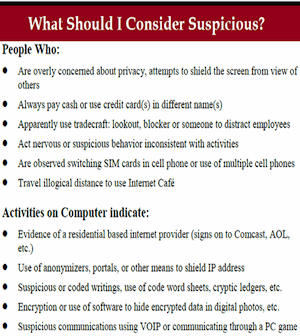
image courtesy of FBI.gov
Many of the items on the FBI’s “What Should I Consider Suspicious?” agent training list are routine tasks for preppers, as well as the average American citizen.
The FBI terrorism lookout list
- Purchasing coffee with cash on a regular basis: Apparently citizens who prefer cash to accruing credit card debt or debit card fees are considered potential suspects. Until the 1950s, credit cards which could be used at more than one store did not even exist. The Diners Club card was the first multiple location charge card and was geared towards salesmen and businessmen who often conducted meetings at restaurants and not the average family. The card was not made of plastic and had to be paid in full at the end of the month. American Express created the first plastic credit card in 1959. Initially, charges on the card were solely for entertainment and travel purposes, and the bill also had to be paid by the end of the month. A national credit card system was formed in 1966 by Bank of America. Cash was still king well into the 1970s. During this era of cyber hacking and identity theft, paying for coffee (or anything else) in cash is just good old-fashioned common sense.
- Paying cash for a rental car or a tattoo: Once again, merely opting to live within your budget and a desire to protect your identity from cyber hackers should not place Americans on an FBI watch list. Presumably, rental car agencies require a driver’s license before leasing a vehicle to anyone. Law enforcement officers often have a valid reason to review rental car records and tattoos related to a particular gang or group while investigating criminal cases… with a warrant, of course. While law-abiding and patriotic Americans do not want to place obstacles in front of officers and agents, we also do not want to be considered potential terrorism suspects simply because we opt to use cash for such activities. Searching through computer records is a tedious and time-consuming task. There is no reason to further clog up the process by tossing in all the names of thousands of citizens who just prefer to use cash and not credit cards.
- Taking inappropriate photos or videos: FBI agents surely should be made aware of individuals who appear to be doing surveillance of buildings, water plants, or various forms of infrastructure. Such surveillance could pose a threat to national security. There is a very fine line between possible surveillance and innocent picture or video taking. While questioning someone (and even requesting ID to run) who appears to be engaging in potential surveillance activity is understandable, Gestapo tactics should not be used when a citizen opts to shoot a video or take photos of any government office , facility, or piece of infrastructure for educational, professional, or sightseeing purposes.

-
4.
Related articles
- The United States of Securitopia (algemeiner.com)
- Retired FBI Counter-Terrorism Agent Confirms NSA Whistle-Blowers: Feds are Recording All Cell Phone Conversations (+videos) (joemiller.us)
- It Seems A Bit Early To Call Edward Snowden A ‘Hero’ (businessinsider.com)
- Verizon records vacuumed up by NSA under ‘top secret’ Patriot Act order (zdnet.com)

No comments:
Post a Comment
Hello and thank you for visiting my blog. Please share your thoughts and leave a comment :)